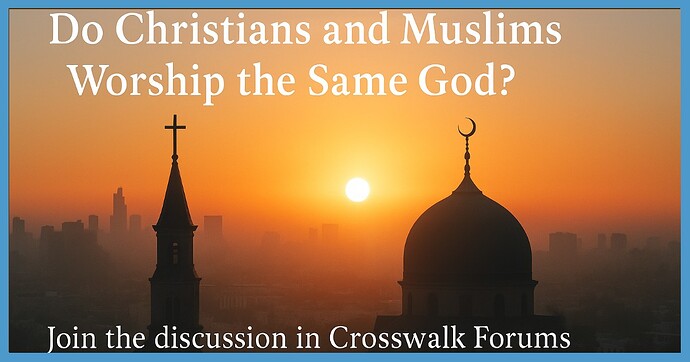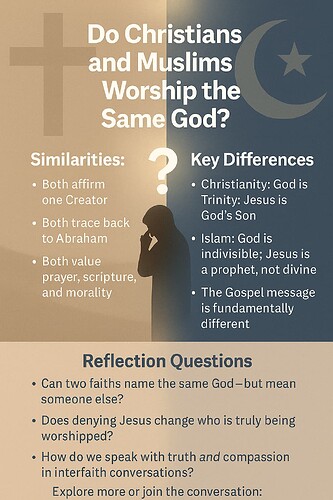I understand the word ‘nature’ to be a reference to what is fundamental, or essential, about a being. It is that which makes a being – any being – what it is.
Christian notions concerning the nature of Yeshua (ʿalayhi as-salām) are derived from selected interpretations of scripture, augmented by the opinion of sympathetic scholars.
The process is simple enough:
Read……interpret……discuss…reach a decision……formulate a notion……make a declaration……claim sole possession of the ‘truth’……and declare as ‘heresy’ all opposing notions. Thank you very much, and have a nice day!
According to the Nestorians, Yeshua is one person, two hypostases and two natures.
According to Trinitarians, he is one person, one hypostasis and two natures.
Monophysites, on the other hand, hold that he is one person, one hypostasis, and one nature.
For Jews and Biblical Unitarians – and the rest of us folk – he is just a man: one person; one nature; no hypostasis.
Mike Robinson (a Christian apologist) writes:
‘Jesus as the Son of Man and the Son of God has two natures found in one person……The Bible reveals the dual nature of Christ and humanity’s salvation demands that be the case. It’s a mystery, but a mystery that in selected ways not only makes sense, but is necessary for redemption. Jesus, in the incarnation, did not lose His divinity. He did not lose His authority or His deity. He voluntarily came to the earth as a human baby to live perfectly as He fulfilled the Law…..He took on our humanity in order to die in our place….’ (‘How Jesus Became God In The Flesh: The Proper Exaltation Of A Prophet From Nazareth: Bart Ehrman Refuted’).
On the other hand, Adrian Thatcher – a staunch defender of Chalcedonian Christology – writes:
‘There is scarcely a single competent New Testament scholar who is prepared to defend the view that the four instances of the absolute use of “I am” in John, or indeed most of the other uses, can be historically attributed to Jesus.’ (‘Truly a Person, Truly God’).
There is broad agreement among New Testament scholars (and has been for decades) that Yeshua did not consider himself to be God.
Consider, by way of example, the following quotations:
‘Any case for a “high” Christology that depended on the authenticity of the alleged claims of Jesus about himself, especially in the Fourth Gospel, would indeed be precarious.’ (The Rev. C.F.D Moule: ‘The Origin of Christology’).
‘Jesus did not claim deity for himself’ (Archbishop Michael Ramsey: ‘Jesus and the Living Past’).
‘There (is) no real evidence in the earliest Jesus tradition of what could fairly he called a consciousness of divinity’ (James Dunn: ‘Christology in the Making - a New Testament inquiry into the origins of the doctrine of the incarnation’).
‘It is no longer possible to defend the divinity of Jesus by reference to the claims of Jesus’ (Canon Brian Hebblethwaite: ‘The Incarnation’).
‘There is good evidence to suggest that (Jesus) never saw himself as a suitable object of worship’ and that it is impossible to base any claim for Christ’s divinity on his consciousness once we abandon the traditional portrait as reflected in a literal understanding of St. John’s Gospel’ (The Rev. David Brown: ‘The Divine Trinity’)
‘The historical Jesus of Nazareth did not teach or apparently believe that he was God, or God the Son, Second Person of a Holy Trinity, incarnate, or the son of God in a unique sense.’ (John Hick: ‘Believable Christianity’.
John Hick writes:
‘These quotations (which could be multiplied) reflect a remarkable transformation resulting from the modern historico-critical study of the New Testament. Until about a hundred years ago (as still very widely today in unlearned circles) belief in Jesus as God incarnate was assumed to rest securely upon his own explicit teaching: ‘I and the Father are one’, ‘He that hath seen me hath seen the Father’, and so on.’ ‘The Metaphor of God Incarnate – Christology in a Pluralistic Age’).
Hick reminds us that one response to the realisation that Yeshua did not claim to be God:
‘…has been the use of the concept of the ‘Christ-event’. This helpfully elastic idea is now widely used to take the weight off the pillar of dominical authority, now found to be hollow, by shifting it to the historically solid fact of the church’s teaching. For the ‘Christ-event’ is supposed to consist not only in the life of Jesus but also in the formation of the church and the growth of its faith in Jesus’ deity. It is this larger complex, rather than Jesus’ own words and actions, that are now said to authorize the belief that he was God incarnate.’ (Ibid.).
Blessings.



